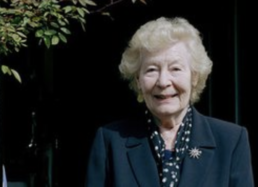These life stories may contain descriptions of childhood trauma and abuse, as well as images, voices and names of people now deceased. If you need help, you can find contact details for some relevant support services on our support page.
Award-winning English writer, Nina Bawden (1925-2012), was in foster care as a teenager.
Nina Mary Mabey was born in Essex, but spent twelve years growing up in the suburbs of London. Her father, Charles Mabey (christened Mario Angelo Benati), was an engineer in the merchant navy and often away from the family. Her mother, Ellaline (called Judy), was a former teacher. Nina had four siblings.
As a child, Nina took pleasure in imagining the drama going on behind the closed curtains in the look-a-like houses which her mother called “featureless and ugly.”
Nina’s mother helped her study and earn a scholarship to attend Ilford County High School, a grammar school which would enable her to go on to university.
There were other ways out of poverty in the East End of London—boxing, or becoming an Olympic swimmer…or a film star…but the educational ladder was the obvious one for my mother to choose for her children (Bawden, p. 30).
Nina was happy with the school. She felt she was treated well by friendly teachers.
During WWII, Ilford County High moved out of London to safer areas and the students were billeted with foster families.
The government paid foster parents a small weekly sum; it varied between ten shillings and seventeen shillings, depending on the age of the child (Bawden, pp. 45-46).
Nina had a number of placements between August 1939 and 1941 in Wales and Ipswich. For the most part, she enjoyed the experience. At age fourteen, she was ready for time away from her mother and ripe for an adventure.
I didn’t miss my London suburb. I missed my mother and my brothers, but I didn’t miss my home. Life in other people’s houses, even if not always comfortable, was much too interesting to leave room for being homesick.
Nina primarily described her foster parents as kind, albeit some were a bit weird. One couple, for example, locked themselves in their house as if it was a fortress, and another was decidedly creepy.
When the school resumed teaching from London around 1942, Nina’s mother was renting a farmhouse in the country and decided to stay. So, Nina lived with her good friend Jean while finishing high school.
Although Nina acknowledged that her period of being ‘homeless’ was “nothing compared to what happened to less fortunate children in the rest of Europe”, it did sensitise her to the plight of refugees and “outside children” about whom she wrote.
Some of these characters include Squib, an abused child, Jane Tucker in The Outside Child, and Mary in The Runaway Summer. Nina believed that “outside children are in fact inherently more interesting.” This is because “you want to see how they make out” due to the adversity they face.
Nina received a scholarship to attend Oxford University and commenced her studies in 1943. At Oxford, she met actor Richard Burton, who had also been in foster care as a teenager.
In 1946, Nina married ex-serviceman Henry Bawden. She began to write novels while at home caring for her two sons, Niki and Robert. Nina later had a daughter, Perdita, with her second husband, Austen Kark.
Nina was twenty-six before she found out she had an older sister, Pat, her father’s daughter from his first marriage. When Nina’s parents were first married, Pat, whose mother was dead, lived with them. Around nine months after Nina was born, the two girls were sitting at the top of the stairs one day when Pat went off to the bathroom leaving the younger girl alone. Nina fell down the stairs and Nina’s mother accused Pat of pushing her. In response to the upset, Nina’s father took Pat to live with two women cousins.
Over the course of a five-decade writing career, Nina published a total of twenty-three adult novels and twenty children’s books.
Among her adult novels, Afternoon of the Good Woman (1976) won the Yorkshire Post Novel of the Year, and Circles of Deceit was shortlisted for the Booker Prize in 1987. She won the Guardian Award in 1976 for her children’s book, The Peppermint Pig. Another of Nina’s children’s books, Granny the Pag, was shortlisted for the Carnegie Medal in 1996.
Several of Nina’s novels were adapted for film and television, including The Solitary Child (1956), Carrie’s War (1973), Circles of Deceit (1987), and Family Money (1991). In April 2023, Virago Modern Classics published a new hardback edition of Carrie’s War in recognition of the novel’s 50th anniversary.
Nina’s final book, Dear Austin (2005) is a memoir and tribute to her second husband, who died in a train accident in which Nina herself was seriously injured.
Nina served on a number of committees in her lifetime, including Pen International and the Royal Society of Literature. She was appointed Commander of the Order of the British Empire (CBE) in 1995.
Nina passed away in 2012 at the age of eighty-seven. She is survived by her son, Robert.
References
“Nina Bawden.” The Telegraph, 22 Aug 2012. https://www.telegraph.co.uk/news/obituaries/culture-obituaries/books-obituaries/9492900/Nina-Bawden.html
Bawden, Nina. “The Outside Child”. Horn Book Magazine, 67(1991), pp 688-765.
Bawden, Nina. In My Own Time. Almost An Autobiography. Virago Press, 1994
Brown, Lauren. “Virago Modern Classics to publish 50th anniversary edition of Carrie’s War.” The Bookseller, 13 Dec 2022. https://www.thebookseller.com/news/virago-modern-classics-to-publish-50th-anniversary-edition-of-carries-war
Image available here.
